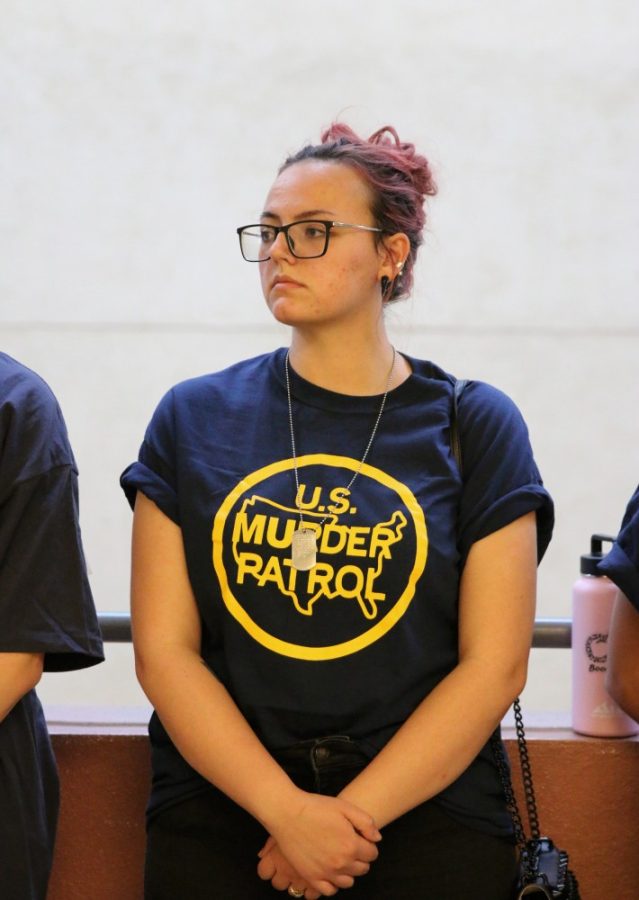College Republicans invited Art Del Cueto, the Vice President of the National Border Patrol Council, to speak in the aftermath of a confrontation between students and Border Patrol agents that garnered international news coverage.
University free-speech monitors were present both outside and inside the meeting. The recent series of events, starting with the original confrontation on March 19 and subsequent discussions on campus, has drawn international coverage to the University of Arizona. The debate on how students can express themselves on campus is foreshadowed by a national discussion that began in the White House some weeks earlier.
RELATED: OPINION: Charges against student protesters are an affront to free speech
President Trump recently announced he would release an executive order that would help guarantee free speech at colleges and universities. Trump planned to protect all views by revoking government funding from institutions that do not promote free speech on their campuses.
Trump announced his plans to a crowd at the Conservative Political Action Conference outside Washington. Conversation of an executive order began in response to young conservatives expressing that their voices are stifled by left-leaning students and administrations.
In an interview unrelated to the Border Patrol incident on campus, UA’s Vice President of Communications, Chris Sigurdson, said he interprets the university’s position on issues of speech and expression using a set of guidelines shared by many other institutions.
“Almost every change that we made for social justice as a country, from the cessation of slavery, women’s suffrage and the right to vote, came because somebody said something that stuck,” Sigurdson said. “The give and take, the free discussion of ideas, is critical to learning, to critical scholarship”.
Expression and speech on college campuses has been a hot-button issue since their founding. College protests are both the result and continuation of the national discussion of landmark issues that define generations.
Three UA students became the center of the speech debate at UA last month after a viral video showed students protesting the presence of U.S. Customs and Border Protection agents on campus.
Last week, all three students were charged with “interference with the peaceful conduct of an educational institution,” for which they face up to six months in jail.
The students cited by the University of Arizona Police Department following the original confrontation were cited due to time, place and manner restrictions, which are the set of laws in place to regulate speech in public places. No demonstrations can occur inside classrooms or the administration building where learning or university business occurs. Sigurdson stated the UA relies on time, place and manner restrictions to regulate most actions on campus.
RELATED: OPINION: The real Arizona is competitive
“We can stop something like if somebody was standing outside a residence hall at 10 o’clock at night with a megaphone,” Sigurdson cited as an example.
According to the Daily Beast, one of the protesters said she felt her treatment was unequal compared to other frequent speakers on campus. She noted the case of “Brother Dean Saxton,” a preacher who migrates across college campuses in the U.S.
“We all remember Brother Dean Saxton,” said Denisse in an interview with Daily Beast. “He’d yell at people walking by, at women, saying ‘you deserve to get raped,’ saying people who wear leggings deserve to get raped. He’d sit out there for hours, yelling and yelling. They let him get to the point where he kicked someone in the chest.”
The theory behind the speech and expression clauses of the First Amendment is to maintain the free flow of ideas, where people with all viewpoints are welcomed to express themselves freely. Unpopular viewpoints find themselves grandfathered into the system, meaning most institutions tolerate hate speech to allow for speech that benefits society.
“What we have right now, I think, is a tension between people who want to live and work in a civil environment with other people’s free-speech rights,” said Sigurdson.
Universities are a national symbol for growth and exploration. College-aged citizens are developing their view of the world as they see it, and there is an invaluable worth to the exchange of those ideas and experiences.
The theory is that if we allow for all viewpoints to be out in the open, we can evaluate those perspectives and improve our own. It’s an evolution that can only continue with open communication, even if that communication can be hurtful. As we all know, theories are made to be tested.
“How do you make anything better if you can’t talk about it?” Sigurdson said.
In the age of ‘political correctness’ the conversation, specifically how we have the conversation, is shifting beneath our feet. There is a clash between what each generation defines as acceptable speech.
“If you give any room to not have free speech, then you get censorship, and you can’t speak about the problems that really matter,” said Paula Mercado, a junior majoring in international human rights.
Cassandra Baserman, president of College Republicans at the UA, also described her view on First Amendment rights on campus.
“Being a constitutionalist and a Republican, the constitution is very important. The First Amendment was written by the founding fathers, so obviously it has a huge significance to us,” Bauserman said. “To say how you feel is very important, but there is a difference between right of speech and harassment.”
The University of Arizona’s stance and enforcement of free speech will continue to be tested as three UA students await their court hearings in the coming weeks.
Follow Maya Noto on Twitter









